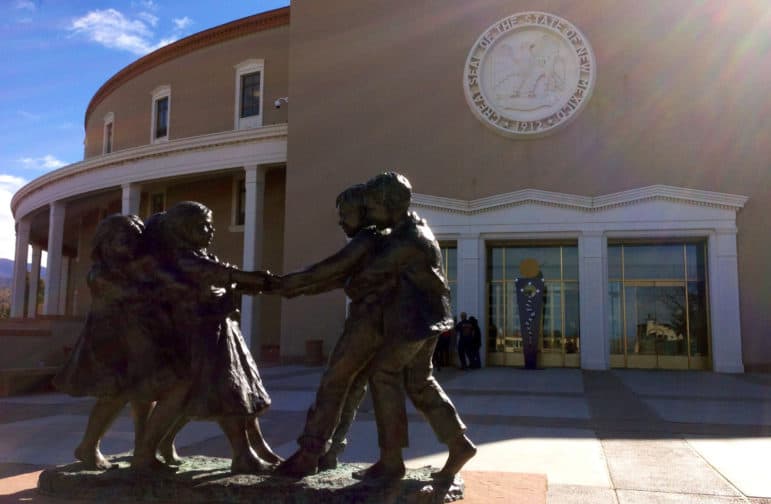
Heath Haussamen / NMPolitics.net
A statue outside the Roundhouse in Santa Fe.
Gov. Susana Martinez on Thursday vetoed a bill intended to stop penalizing public school teachers on their evaluations if they take more than three days of sick leave, making good on her promise to keep intact a teacher rating system that has been heavily criticized by educators since it was put in place in 2012.
The veto drew immediate rebukes from teachers unions and, in a rare move, prompted one of the bill’s sponsors, Sen. Craig Brandt, R-Rio Rancho, to say he will attempt to muster enough votes to override it.
It would be the first attempt to override a Martinez veto in the six years she’s been governor. Momentum for an override could be stalled in the House, however, where enthusiasm for overturning the governor’s decision appeared less urgent Thursday. To override the veto, the Senate and the House would need a two-thirds majority vote.
The legislation, dubbed the “Teachers Are Human Too” bill by its sponsors, had cleared the Legislature with near unanimous support. The bill would have allowed teachers to take up to 10 days of sick leave without hurting their performance evaluations.
The Senate passed the bill with no dissenting votes. The House passed it 64-3. The main sponsor of the bill was Rep. Jason Harper, a Republican from Rio Rancho. Co-sponsors included two Democrats and two Republicans.
In a joint statement Thursday, Harper and Rep. Dennis Roch, R-Logan, another sponsor, made no mention of an override. “… We respect Gov. Martinez’s decision to veto House Bill 241 and we understand her desire to use a comprehensive approach when considering changes to the state’s teacher evaluation system,” the statement said.
Martinez explained her veto in a written statement. “While I recognize the Legislature’s attempts to support our teachers in their lives outside of school, I am unable to sign House Bill 241,” she stated. “I believe in the importance of having our full-time teachers, not short-term or long-term substitutes, in our classrooms with the students who depend on their expertise. … We need our teachers in our classrooms, and House Bill 241 would lead to more teacher absences.”
Republican Martinez had made no secret of her intent to veto. On the day it passed, her spokesman said, “It’s DOA.”
In her message, Martinez wrote, “HB 241 would increase substitute teacher costs to districts and the state to stand in for absent teachers more frequently. I am proud that, since 2012, the number of teachers missing 10 or more days has decreased from 47 percent down to only 12 percent in 2016. I’m also proud that in the 2015-2016 school year alone, the state and districts realized $3.6 million in savings to invest back into the classroom where it belongs. HB 241 threatens to take us back to pre-2012 teacher absenteeism levels, and our districts cannot afford to pay more substitutes to cover for the teachers they have already hired.”
She also pointed to a study by the National Bureau of Economic Research that she said “suggests that the effectiveness of an experienced teacher with 10 or more absences is comparable to that of a teacher with no teaching experience at all.”
“Our students, parents, and taxpayers deserve better than increased costs for lower-quality instruction,” Martinez said.
Both Stephanie Ly, president of American Federation for Teachers New Mexico, and Charles Boyer, executive director of the National Education Association New Mexico, denounced the veto and called for a veto override.
During the Senate debate, Brandt said, “Teachers will do a better job teaching and will not get the students sick if they are healthy when they are in the classroom. We should not punish them for doing their job.”
Martinez criticized legislators for killing a bill that would have granted “experienced and qualified professionals two-year licenses as adjunct instructors to become fully-licensed teachers in another two years. They argued that such professionals lack the training and education to be successful in the classroom, regardless of their real-world experience in the field they would teach. It does not follow, then, to pass a measure that would increase the use of substitute teachers in place of full-time teachers.”
The governor said her Public Education Department has supported an increase in the number of days of sick leave that a teacher may take without an impact on their evaluation to five days from three days and has backed legislation that would have decreased the weight of student achievement in teacher evaluations to 40 percent from 50 percent. “There is still time in the session to come together to reach a consensus,” Martinez wrote.
The Martinez administration in 2012 implemented the state’s teacher evaluation system by rule after failing to win legislative support for it. It uses student test scores, observations by principals and teacher attendance, among other factors, to measure a teacher’s performance.
Teachers and Democrats in the Legislature have filed two lawsuits against the Public Education Department challenging the evaluation system. One suit claims the Martinez administration unlawfully took control over teacher evaluations away from local school districts. Another argues that the evaluations are fundamentally unfair and could put teachers at risk of being punished or even fired.
Both suits are awaiting trial dates.
Contact Steve Terrell at (505) 986-3037 or sterrell@sfnewmexican.com. Read his political blog at www.santafenewmexican.com/